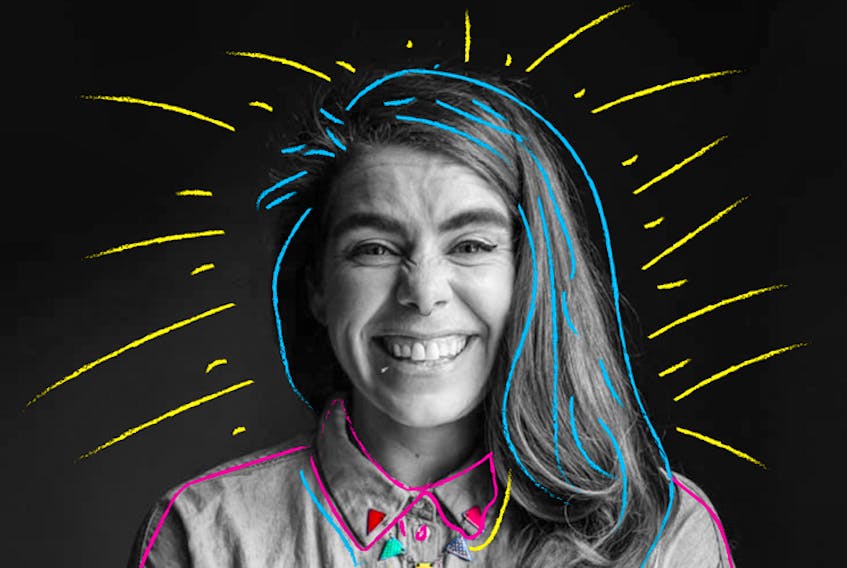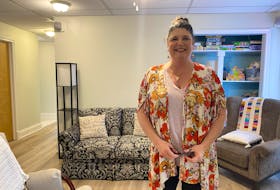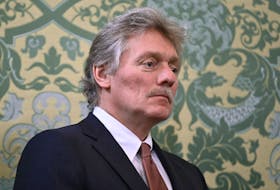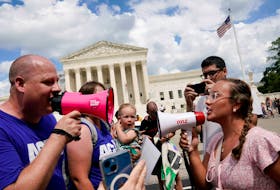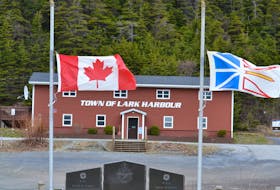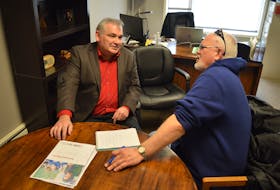Around the early part of 2017, Jennifer Crawford started baking cakes, a lot of them.

After giving up alcohol and entering recovery for PTSD, their imagination began to rebloom; creativity was one of the first things they lost to the disorder. Channelling that creativity into cakes, Crawford (based in Toronto, but originally from Kingston, Nova Scotia) began following Instagram cake accounts and cake-related subReddits for inspiration, only to be inundated by an explosion of pink and blue 'gender reveal' cakes.
Seemingly benign to many, Crawford — who is non-binary (or enby) and goes by they/them/their — recognized potential harm in the overtly gendered baking. The focus on a gender binary (male or female) could be alienating for those who exist between (or beyond) the two poles. So Crawford created their own take: a gender repeal cake.
"It's nice to like give people options. People think of dissent as just picking stuff apart or criticizing, and those actions are very important. But it can also be really generative and optimistic and hopeful," Crawford says. "I imagine a day where people can be, 'oh, actually I would like to repeal this gender I got assigned at birth, this one doesn't fit anymore. Is that cool?' Yeah, totally. Let's have a party!"
Crawford, who came out on top on this season's Master Chef Canada, is, as far as they know, the first non-binary contestant (and winner) in Master Chef history. They still get choked up over the messages and photos they receive from others, sharing the cakes made to celebrate their identities among their own families, coworkers, and friends.
"The idea that you can take a cake and turn it into something that connects people, real people, is so exciting," says Crawford. “It feels like such a gift to make a small contribution towards this community I care about so much.”
For Crawford, who often is misgendered, being on the show put their identity on display very publicly.
"Sometimes [being misgendered] doesn't bother me because I see the way people talk about me as a reflection of where they're at, as opposed to where I am — which is so incredibly freeing," says Crawford. "But the show in some ways forced my hand, showing me how important that was to me, which feels like a gift that I am going to be forever grateful for."
Just Be Gemma

For Newfoundland activist and author Gemma Hickey — who in 2015 walked 938 kilometres across Newfoundland to raise awareness (and funds) for survivors of religious institutional abuse — their arduous journey ended with a new realization: they were transgender.
"It was as if I walked from one side of the island to the other side of myself," says Hickey. "I knew where my destination was. I just didn't know where it was going to lead me."
Their story, as told in the documentary Just Be Gemma, aired on CBC in 2017. It's also the subject of their upcoming book, Almost Feral, to be released this October by Breakwater Books.
Hickey, who was raised Roman Catholic, had come out as a lesbian in their teens — after failed conversion therapy ended in a suicide attempt. Once recovered, Hickey decided to embrace their queer identity, long before they knew transgender and non-binary people existed.
After coming out, Hickey realized their homophobia was more internal than external. The people around them were loving and supportive. Based on that, they wanted to help create a world where young people felt loved and supported.
For more than 20 years since, Hickey has been an activist: serving as President of PFLAG Canada and at the helm of Egale Canada in 2005, when same-sex marriage became legal across the country. Hickey — based in St. John's — is also the founder of The Pathways Foundation, an organization advocating for victims of clergy abuse. Hickey suffered sexual abuse at the hands of a Roman Catholic priest in their youth, a catalyst for the 2015 journey that would change their life.
RELATED: Language needs to evolve as we do
In 2017, Hickey (who also uses they/them pronouns) filed an application with the Supreme Court of Newfoundland and Labrador. The petition challenged Newfoundland's provincial Vital Statistics Act, asking for a birth certificate affirming their non-binary identity.
The province, avoiding court, changed the legislation, allowing Newfoundlanders over 16 to change their gender to X (as opposed to M/F) on drivers licenses, health cards, and birth certificates. And on December 14, 2017, Hickey received their new birth certificate — believed to be the first in Newfoundland — with the gender-neutral marker.
'I don't feel that it is necessary to know exactly what I am.'
As a teen on Prince Edward Island in the late 90s, Isaac Grant quickly realized he was bisexual. But with no LGBT role models, he mostly kept his identity hidden. It wasn't until years later, after his long-term relationship ended and he began reflecting on his life, that he realized something was amiss. Around that time, he first encountered the idea people could be gender non-conforming, or non-binary, and things started to make sense.
These days Grant is CEO of silverorange — a software and app development studio he co-founded 20 years ago with friends — and identifies as genderqueer (one who shuns conventional gender distinctions) with a side of femme and uses he/him pronouns, although that is likely to change.
"I think one of the gifts of having a complicated gender identity is that it forces you to do a lot of work. You do a lot of self-examination of why you're feeling certain things," says Grant. "I think that's a very valuable thing. It is wonderful and joyful to accept parts of yourself and embrace and grow with them."
There's a quote by renowned philosopher, Michel Foucault, that says, 'I don't feel that it is necessary to know exactly what I am. The main interest in life and work is to become someone else that you were not in the beginning.'
Crawford agrees.
"I don't feel such a pressure to figure it out, to nail down what I am. I don't want to spend my time figuring it out. I want to spend my time becoming whoever it is I am meant to be.
Robyn McNeil is all about her kid, her cat, her people, good stories, strong tea, yoga, hammocks, and hoppy beer.
More Alternative Lifestyles:
- Brian Braganza came to rural Nova Scotia and helps people find the courage to make a better world
- Cape Breton's Amber Tapley reshaped her life and launched a healing business
- Last Stop Alaska: Couple moves into school bus and sets out on journey of a lifetime
- Get in touch with nature with open air learning
- Off grid living in Cape Breton
- Speak the language, save the culture: Working to preserve Mi’kmaw in Nova Scotia
- Baking and being non-binary in Atlantic Canada

